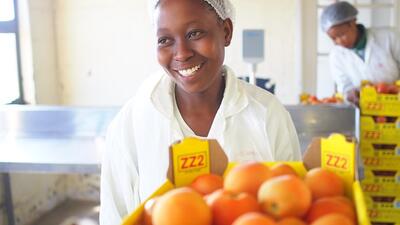
Diversifying for new markets: Lesotho’s new trade strategy (en)
Lesotho, a landlocked African country surrounded by South Africa, might seem small geographically, but it has significant untapped export potential.
For this reason, the Ministry of Industry and Trade of the Kingdom of Lesotho reached out to its longstanding partner, the International Trade Centre, to jointly develop its National Trade Strategy. Lesotho's other longstanding financing partner, the Enhanced Integrated Framework, once again stood ready to support their endeavours.
Micro, small and medium-sized enterprises (MSMEs) make up the majority of business in Lesotho and will profit from diversifying their products and reaching new markets. For instance, there is export potential in horticulture, textiles and apparel, and the country's relatively strong light manufacturing industry. Lesotho also has tariff-free access to several international markets.
According to IMF projections, Lesotho's real GDP is expected to fall by 4.8% in 2020 due to the COVID-19 pandemic, so there is a pressing need for this strategic approach towards trade and investment.
The Ministry was proud to officially launch the strategy on 10 December during a virtual event including remarks by Honourable Dr. Thabiso Molapo, Lesotho's Minister of Trade and Industry, Ratnakar Adhikar, Executive Director of the Enhanced Integrated Framework (EIF), and Pamela Coke-Hamilton, Executive Director of the International Trade Centre (ITC). Other important stakeholders from the European Union (EU) and the Southern African Development Community also joined the event, which also saw the launch of Lesotho's National Trade Policy, financed by the EU.
'I would like to acknowledge with gratitude the leadership of the International Trade Centre and their expertise in designing this strategic document,' said His Excellency, the Minister of Trade and Industry, Dr. Molapo in his address.
'The Ministry successfully managed to mobilize the civil society, private sector and academia, and energize multiple agencies in the public sector to ensure that this was a truly inclusive process,' said Ms. Hamilton of ITC. 'I am confident this participatory approach will continue to permeate the implementation of the strategy and safeguard its success.'
Mr. Adhikar of EIF added: 'Given the level of export market concentration (two markets accounting for over 95% of exports) and export product concentration (apparel accounting for 35% of exports), these elements are necessary for achieving sustained export diversification. That is why we are happy to continue supporting this project with an additional preparation grant of $100,000. '
About the Strategy
The National Trade Strategy is a joint response to tackle Lesotho's trade constraints for better export development.
Over the next five years, the strategy's vision of "Export competitiveness for sustainable growth" will focus on three strategic objectives in the priority sectors of horticulture, textiles and garments and light industry:
- Strengthening the competitiveness of the business ecosystem and improving trade facilitation
- Intensifying existing trade relationships and diversifying the range of export destinations
- Expanding the national productive capacity and diversifying the export basket
For more information on the strategy, please contact:
Alberto Amurgo Pacheco at amurgo [at] intracen.org (amurgo[at]intracen[dot]org).



